Chris Baty's Blog, page 78
June 26, 2019
Read the YWP Flash Fiction Contest Grand Prize Winner (13 and Under Division)!
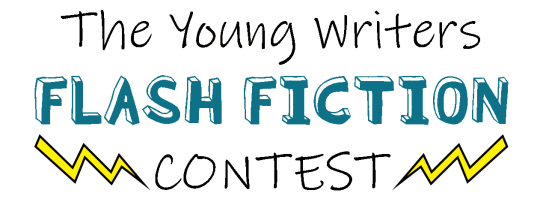
Last month, we challenged our young writers (18 and under) to submit a 300-word story involving a balloon. From over 1,100 fabulous entries, we chose two Grand Prize Winners and eight Honorable Mentions. We hope you enjoy reading them as much as we did!
Red to catch the dragon’s eye, the balloon floated away from the cliff. Shana struggled against her bonds, searching for the small knife she kept hidden in her sleeve as the balloon carried her farther into the sky. Below, her former tribesmen watched her float off. A sacrifice for the dragon. Some tribemates.
The knife slipped free, and Shana twisted, taking it in her bound hands. She sawed awkwardly at the rope. Dragon’s Mountain loomed closer, its two peaks spreading like bat’s wings.
Or dragon’s wings.
A perfect place for a dragon to live.
Finally the blade bit into the rope. Shana dragged at it, cutting into the fibers. She felt one break, snapping against her wrist as it did so. Others came after, quicker.
And still the balloon floated onwards.
The last fiber cracked apart, and Shana pulled her hands free from the rope. She bent to her feet and slashed the knife across the bonds.
She glanced up and could now see the dark hole of the dragon’s lair. The winds were perfect, pushing the red balloon closer and closer. Ever closer.
At last her feet were free. Shana stood and grabbed at the ropes attaching the basket to the balloon. Could she climb to the flame that kept her aloft, and blow it out? But the fire was too sheltered. She glanced down. Burnt, barren land, dotted with rivers of lava, changed to sharp craggy rock.
Something rumbled. Shana looked up. The dragon had emerged.
Black, massive, it spread its wings and loomed up. Stained teeth glinted as it lunged.
And Shana jumped. A desperate leap for freedom. She landed hard, heard snapping, felt pain. The rock scraped her. But she stumbled up and ran despite the agony. She would not be a dragon’s lunch.
Special guest judge Claire Kann had this to say about “The Sacrifice”: “
The tension in this story was spectacular! I loved the sparse but effective world-building, the sharp, clean prose, and the compelling imagery. The main character, Shana, was daring, scrappy, and resourceful—my favorite kind of protagonist.”

Miriam G. loves horses, cats, and randomly starting novels that will never have more than a chapter written of them. She is guilty of Writing Way Too Much About Dragons, and nearly everything she writes must include a dragon or it usually doesn’t amount to much. Additionally, she’s diagnosed with Adding Horses for No Particular Reason. Luckily, cats have managed to escape this horrible habit, partially because she lives with the sweetest kitty in the world.
June 24, 2019
Read the YWP Flash Fiction Contest Grand Prize Winner (14-18 Division)!
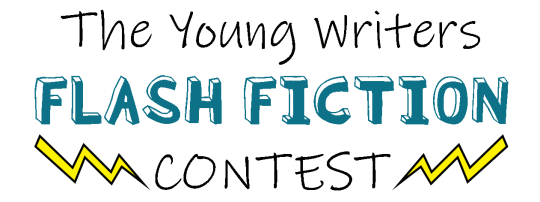
Last month, we challenged our young writers (18 and under) to submit a 300-word story involving a balloon. From over 1,100 fabulous entries, we chose two Grand Prize Winners and eight Honorable Mentions. We hope you enjoy reading them as much as we did!
“Fate” by Lainey T. — Grand Prize Winner (14-18 Division)Beatrice had never seen an unopened portal before.
A translucent balloon filled with olive green vines hovered over the sidewalk in front of her. Carmine flowers decorated the greenery, stray petals scattered on the ground.
The street was empty except for Beatrice and the balloon as if it was meant only for her eyes. Which was impossible, because Beatrice wasn’t supposed to discover portals. She was supposed to do her homework and go to class. Her friend, Alexis, always found the portals and dragged Beatrice along on her adventures.
Beatrice pulled out her phone to text Alexis. She was the one who slew dragons, saved kingdoms, and who was written about in history books across countless worlds. Beatrice tagged along as emotional support.
“Do you go looking for this stuff or something?” Beatrice had asked her once when they had entered a realm populated by giant, sentient rocks.
Alexis had grinned. “Adventure finds me, I guess.”
Yet here adventure was, finding Beatrice instead.
Even in their world, she was always the sidekick. A background character in Alexis’s story. She wasn’t interesting enough to be anyone else.
But maybe fate had chosen her this time. The thought was absurd because Beatrice was ordinary. She couldn’t lead armies or fight corrupt kings. For her to want more was ridiculous. It would be best to walk away; she had a physics test to study for.
Beatrice still didn’t move. Entering the portal might be the worst decision she could make, but she didn’t care anymore. What did she have to lose?
Perhaps fate had shown up at the wrong doorstep, but it had shown up all the same.
She grabbed the balloon and dug her nails in.
A pop.
A flash of light brighter than the sun.
The street was empty.
Special guest judge Claire Kann had this to say about “Fate”: “What a fun, creative, and intriguing story! Beatrice, the world she lives in, and her goals are established quickly and masterfully. Immediately after finishing, all I could think was: where is the rest? I hope I get to read about Beatrice and her adventures someday.”

Lainey T. is a writer who loves drawing, playing the harp, singing, and petting her dogs. She is going into her junior year of high school and enjoys reading young adult fantasy, realistic fiction, and occasionally science fiction. In her free time, she loves ranting about books to whoever will listen and listening to music. Her favorite part of writing is developing characters and she loves seeing them come to life on the page. She is passionate about storytelling and hopes to someday get her work published.
June 21, 2019
Using Words to Expand Your World

What has writing done for your life? Today, NaNoWriMo participant Lolita shares her personal writing journey in the hope of inspiring writers from around the world to find their voice:
I was born in France.
From the time I was in high school, I developed a love affair with fiction books. I read to understand people and escape my own teenage life. At fifteen, I was often writing in secret. This continued for a few months before I left that draft on the side and wrote some poems that helped me deal with family issues at the time. After that, I went several years without writing anything. Although, from time to time, I remembered that draft I’d written and put aside. At that point, I viewed these writings as a weakness people would look down on instead of seeing the work as an achievement.
Years later, after I finished my maternity leave, I was back at work. I started to write the story of a young woman who would one day become an Amazon. I barely finished the first draft, putting it all aside for about two years. One day, I took a pen and paper and wrote my second draft by referring to the first draft. Then I started to research and sketch what I had in mind for characters and settings.
With a full time day job, my life as a mum, and a contemporary painter, it took me months to realize that I needed to slow down and appreciate all that I was doing.Otherwise, I would burn out and give up temporarily (like I had two years before) or perhaps, permanently.
Coincidently, a health-related issue made me stop everything. I was laying in a hospital bed where I couldn’t write or paint or be with my family. I started thinking of all the things that were going wrong in my life as well as in my book. I did more research. I rearranged things to make them fit together like puzzle pieces. I also found books on how to become a better writer. It felt like my creative process didn’t fit within the methods being suggested. It made me question whether I’d been doing things the wrong way.
So, when I did Camp NaNoWriMo in April, I really thought about whether I was a writer or just pretending. I felt this need to be validated as a writer.
The community of writers I found in the virtual cabin at Camp, showed me that I am a writer as well as a mum, an artist and a book addict.I think that my passion for books has made me more empathic. Reading has shown me things I didn’t know, things we can’t find in textbooks or on TV. Now, I observe people on the streets, in the bus and in shops. I make notes of people’s mannerisms, knowing that the details I see are things that I can use in my book.
I write in English now instead of French. Sometimes, a character feels something that’s better described in French, and I face the challenges of writing in a language that’s not my native tongue. My advice to people who are facing the same issue, is use the words you do know to describe the things you don’t have the right words for, yet.
No matter what, just write!

Lolita is a French native living in the UK for the past ten years. Mother of two and working in a library, she writes fantasy fiction and paints in her spare time. In a life where we live fast, she wants to read books where heroes (males and females) are not perfect and take time to learn to become better. Lolita is still working on her first novel and hopes to publish it this year or next. You can follow her on Twitteror her blog.
June 19, 2019
3 Tips for Writing Magic in FantasyOne of the most interesting...
3 Tips for Writing Magic in Fantasy
One of the most interesting parts of any fantasy book is how magic works in the world the author has created. If you’re a fantasy writer, check out these tips on creating magic when you’re world-building.
1. Make your magic have consistent rules.
Magic in fantasy is a lot like science in sci-fi. It doesn’t need to make perfect sense, but it does need to make logical sense in the context of the world. You can make your magic systems as complex as you want, but however much or little detail you provide, magic should adhere to the rules. It can be strange to us, but it should be consistent.
2. Make your magic have limitations.
Even with supernatural or extremely powerful characters, it’s more interesting to read about them when they have some kind of limitation or obstacle that they have to overcome. For example, wizards in Harry Potter need to memorize spells and (usually) have their wands to channel their power. Fairies and gods are often bound by strict rules and need to work through humans. In some stories, magic users have to fuel their power with their own physical strength. Decide what the boundaries of your characters’ magical powers are.
3. Decide how much your characters know about magic in your world.
How do your characters describe, interact with, or respond to magic? Is magic common or rare? Are magic users respected, or do they have to keep their powers hidden? How does magic complement or conflict with other things that your readers might already be familiar with, like electricity or religious practices? What’s the history of magic in your world?
Find more tips on the “Fantasy Genre Lounge” forum on NaNoWriMo.
June 17, 2019
The next session of Camp NaNoWriMo is right around the corner,...
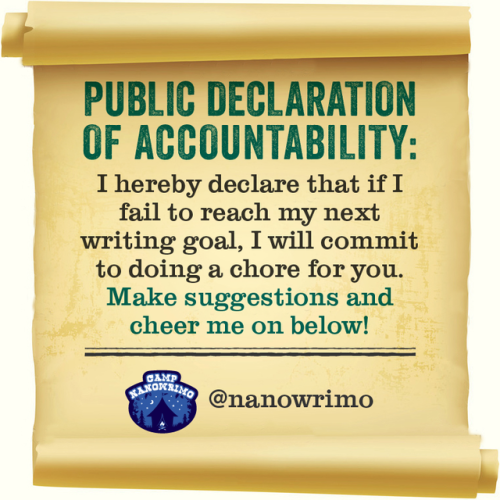
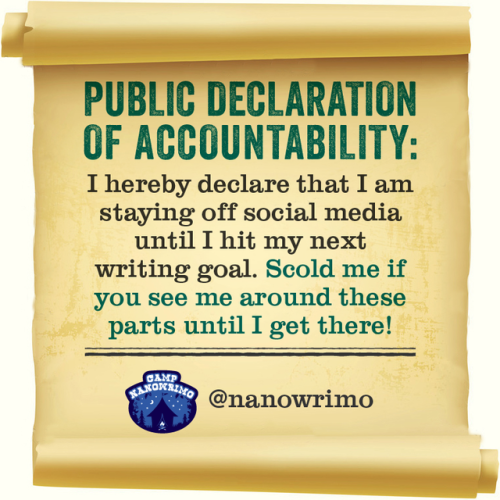
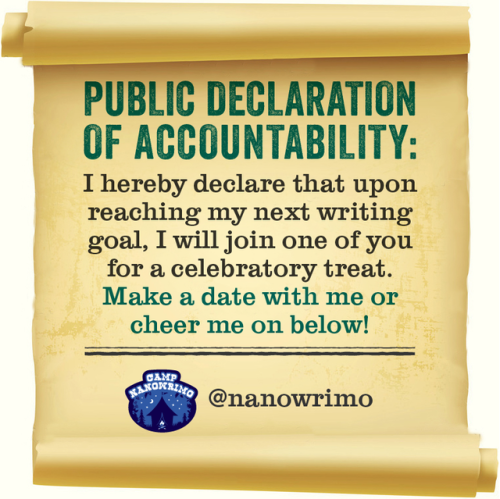
The next session of Camp NaNoWriMo is right around the corner, and with it, the usual myriad of distractions that keep you from writing.
Lean on some public accountability by posting these images on your own social media accounts and asking your friends to help you with promises of rewards, chores, or scolding!
[IMG: Three images on scroll-type backgrounds headed “Public Declaration of Accountability”
The first reads: “I hereby declare that if I fail to meet my next writing goal, I will commit to doing a chore for you. Make suggestions and cheer me on below!”
The second reads: “I hereby declare that I am staying off social media until I hit my next writing goal. Scold me if you see me around these parts until I get there!”
The third reads: “I hereby declare that upon reaching my next writing goal, I will join one of you for a celebratory treat. Make a date with me or cheer me on below!”]
June 14, 2019
How I Turned My NaNoWriMo Novel into a Published Book

Maybe you’re at a point in your writing where you have an actual manuscript sitting on your desk. Congratulations! Now, how do you take that looming stack of finely turned phrases and well-placed plot points and convert them into a bound book? Today, author and NaNoWriMo participant Nikki Hyson delivers a step by step guide to support you on the journey to publication:
For the record, those two words still leave me in a state of dazed awe: Published Book. As a lover of words from a very early age, seeing my name on the cover of a book… just wow…
But you didn’t come here for the wow. I’m betting you came here for the facts. How did I turn a squalling, unwieldy, fledgling NaNo novel into something bright, shining, and ready to walk the stage with diploma in hand?
In November of 2012 I finished my third NaNo Novel. Like the first two, I loved every minute of it. The world building, the character developing, and the plot twists that came out of nowhere. In true pantser fashion, I even gave myself a cliffhanger ending that not even I saw coming. But that’s where it ended. It went on a shelf and I moved on. It’s what I did with all my stories (I have boxes of journals to prove it). Except, this novel, these characters, wouldn’t stay on the shelf. There was a quite decided “what if” hanging over it like a golden cloud.
I heard about the Amazon Breakthrough Novel Contest, so I spent all of 2013 second drafting, asking a few friends to beta read, and polishing it with the help of a story coach. In the meantime, I wrote the sequel during NaNo 2013. Well, I didn’t make it out of Round One of the Amazon Contest. Still, two novels deep in the series, I started thinking about traditional publishing.
Over the next four years, I redrafted it twice with EJ Runyon of www.bridgetostory.com and wrote at least a dozen different query letters to over forty agents. Radio silence. Hmm. Give up? I nearly did. For a year, I stopped sending it out even though I’d written two more NaNo novels, rounding out the story arc and tying up the loose ends.
That’s when I finally heard the question that’d been nudging for a while. “Why not publish it yourself?”There’s an easy answer to that. It’s terrifying! Having the final say on every word can be extremely liberating to most, but it also had me shaking in my boots. What if I mess this up? Of course, I was watching Batman Begins for the eleventh time. Why do we fall? To learn how to pick ourselves up.
All right then. Time to learn. I spent nine months learning everything I could about self-publishing, marketing, what to outsource (cover design!), and where I could cut corners (not buying ISBN and using whatever KDP gives you—for now, anyway). It was a crash course (thank you Chris Fox, Writing Gals, and 20BooksTo50k), but I learned enough to move forward—to plot a course.
On March 16th, 2019 I hit publish on my first fantasy novel, Second Door to the Right. On May 8th I published the sequel, The Forsaken Corridor. Currently, I’m second drafting the third novel out of my messy NaNo 2014 first draft. I hope to have it out the end of July. I still set aside time every week to keep learning, watching podcasts, and scrolling group feeds on Facebook. There’s always something to learn, some new direction to grow, and the words… they won’t mine themselves either. So, like Dory, just keep swimming. Just keep writing. Have faith. Keep your joy. Hope to see you on the shelf beside me.
After spending her teens hopscotching around the country, Nikki settled in Alaska and found it suited her. When she isn’t weaving spells with her words, she can be found snuggling with one of her senior-aged Labradors, walking in the woods, cooking for friends, or lost in a good book. She believes chocolate was invented by wizards, a good cup of Matcha can cure anything, and every maiden is just waiting to rescue the fair prince in distress. If only he’d stop to ask for directions. Visit Nikki on Facebook, Pinterest, or check out her books.
Top photo by Michael D Beckwith on Unsplash.
June 12, 2019
Five Easy Tips for Self-Publishing
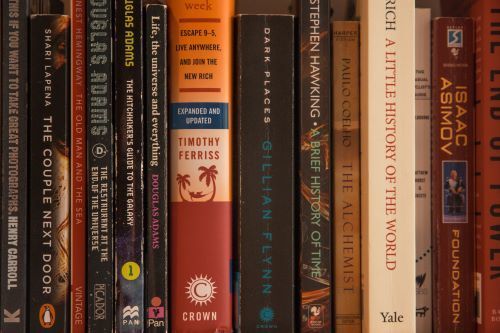
Maybe you’re at a point in your writing where you have an actual manuscript sitting on your desk. Congratulations! Now, how do you take that looming stack of finely turned phrases and well-placed plot points and convert them into a bound book? Today, NaNoWriMo participant Kyesubire delivers a step by step guide to support you on the journey to self-publication:
Self-publishing is the production of media (including books) by an author without the involvement of an established publisher. It is a growing alternative traditional book publishing, where a publisher buys the right to your books, sells them through bookshops, and pays the author royalties on sales they make. Over the years, the royalties have been in decline in some markets, creating the perfect conditions for self-publishing.
Even through it’s gaining popularity, there are key elements that need to be in place to ensure the book is well done so that it will capture the interest of the readers and create impact and income for the author. Five key elements need to be in place for a well done book:
1. Be accountable.Once the author decides to write a book, it is important to ensure it is written well. The work needs to be finished within a set time-frame, and adhere to a high standard. So, the author must focus to ensure that targets are set, communicated, and all effort is put towards making this happen. This can be achieved by committing to an accountability process with fellow writers and readers.
2. Have a good editorial team.Self-publishing removes the usual support structure of editors, managers and staff associated with a publisher. It is important for the author to build a team who will read, assess critique and ensure it is well done. Your team will also help keep you accountable to the tasks and timelines of writing, reading, editing, and approval before the submission to print.
3. Have a good designer.Despite what you may hear, a book is always judged by its cover—particularly, the front cover, layout, and back cover design. An interesting book with a bad cover won’t sell well, plain and simple. The author needs to be deliberate about design quality as it affects the quality of printing and readership. A good designer will bring out the main precepts of the book; add artistic value; and follow rules on size, layout and image clarity and appearance before print.
4. “Print On Demand”Conventional printing is quite expensive. There is often a need to print in larger quantities, but storing these large quantities—as well keeping stores’ shelved consistently stocked—can quickly become costly. “Print On Demand” is a reasonably new print method that allows an author to print as few as two books at a time, with the option to steadily increase the numbers while keeping costs in check. This will ensure better resource management and allocation, no matter how limited the publishing budget may be.
5. Have a marketing plan.It is harder to market books as an individual because one cannot be in two places at once. It is important to develop partnerships with authors of complimentary books, and to book speaking engagements that will make room for sales. Combined with efficient use of social media to create awareness of the book and its availability, together these strategies produce a robust marketing plan.
My mother has always said that your book sales are as good as your ability to sell and showcase value. We have found that to be true in the sales of her books in Kenya. A self-published author is only as good as their ability to sell and entice satisfied readers to promote the books for them. Self-publishing may not be ideal for all markets, but if you are in a location that thrives on it, then take the idea and run with it.

Kyesubire is a visual scribe and storyteller using words and images to connect all aspects of life. She powers from faith to food to health to nature to fiction in ways that encourage viewers and readers to find joy and balance in life through its connectivity. She is telling HIStory of faith, hope, love and family.
Top photo by Host Sorter on Unsplash.
June 10, 2019
The next Camp NaNoWriMo session is just around the...
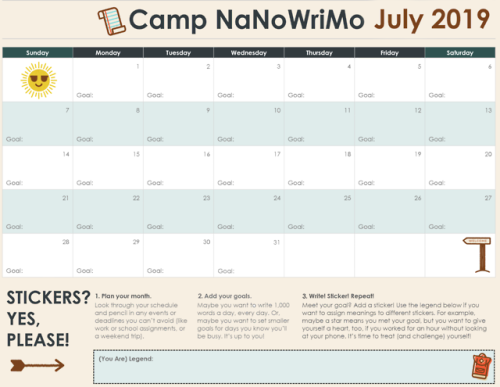
The next Camp NaNoWriMo session is just around the corner! Declare your Camp project today!
Do you have a plan in mind to reach your writing goal in July?Put your plan to paper! Download the image above to print out our daily goal calendar. Give yourself that extra-special boost of a sticker of accomplishment for every day you get your writing in!
[IMG: A July 2019 calendar with a space to jot down your writing goal for each day. Below, a legend with the text:
“Stickers? Yes, please!
1. Plan your month. Look through your schedule and pencil in any events or deadlines you can’t avoid (like work or school assignments, or a weekend trip).
2. Add your goals. maybe you want to write 1,000 words a day, every day. Or, maybe you want to set smaller goals for days you know you’ll be busy. It’s up to you!
3. Write! Sticker! Repeat! Meet your goal? Add a sticker! Use the legend below if you want to assign emanings to different stickers. For example, maybe a star means you met your goal, but you want to give yourself a heart, too, if you worked for a n hour without looking at your phone. It’s time to treat (and challenge) yourself!”]
June 7, 2019
Things I’ve Learned From Camp NaNoWriMo

We’re gearing up for the next Camp NaNoWriMo session in July! Now that you can announce your newest writing project on the site, we’re starting to think about how to best prepare. Today, NaNoWriMo participant Lolita shares a few tips on setting goals and maintaining a daily writing habit before it starts:
When I participated in the NaNoWriMo challenge in November 2018, I managed to hit the 50,000 words challenge by retyping my second draft into a third draft. Mostly, I felt like a cheat because I thought I should have written something new. So, when I received the newsletter about signing up for Camp NaNoWriMo in April, I decided to participate.
For Camp, I decided to tackle the first draft of my second book. Then I could feel like I really achieved something. I got the laptop setup and ready to go. I was full of good intentions before I even started. But I quickly realized that I’d made a mistake. Sitting in front of the computer screen, I couldn’t write a word! I knew what I wanted to write. I knew my characters. I knew the places they were supposed to go to and who they were supposed to meet. I shared some of my struggles with fellow writers via the virtual cabin and realized that it’s okay. I’m still a writer. We are all different, therefore we all write in our own quirky ways.
For me, the hardest thing about being a writer is not a blank page and writers block. For me, it’s the internal battle of feeling like a fake.I’d think to myself: This can’t be the way successful writers create a masterpiece. I never used to speak about those problems because I was the only writer I knew. My husband—while being supportive—does not understand what the writing life is like. Friends and family did not know about my writing until I told them, recently. Camp NaNoWriMo made me realize that I can do this. I am a writer. For me, Camp has been a liberating experience. I don’t know if I reached my target of 50,000 words in April because I didn’t type anything into a computer. But, I wrote a lot freehand.
The main thing I’ve learned in Camp NaNo is that while writing is something we do alone, we are not really alone.We can ask always for advice from the Writing Community.
I’ve spread the word about the benefits of NaNo (and Camp). I will definitely participate again. If you write, then I don’t see a downside to participating in the NaNoWriMo and Camp. Just remember that the support is there if you want it. After all, how many people can you speak to about tenses, funny words and all the other stuff that makes you a writer? People will get it!

Lolita is a French native living in the UK for the past ten years. Mother of two and working in a library, she writes fantasy fiction and paints in her spare time. In a life where we live fast, she wants to read books where heroes (males and females) are not perfect and take time to learn to become better. Lolita is still working on her first novel and hopes to publish it this year or next. You can follow her on Twitteror her blog.
Top photo by Element5 Digital on Unsplash.
June 5, 2019
Join Camp NaNoWriMo This July!
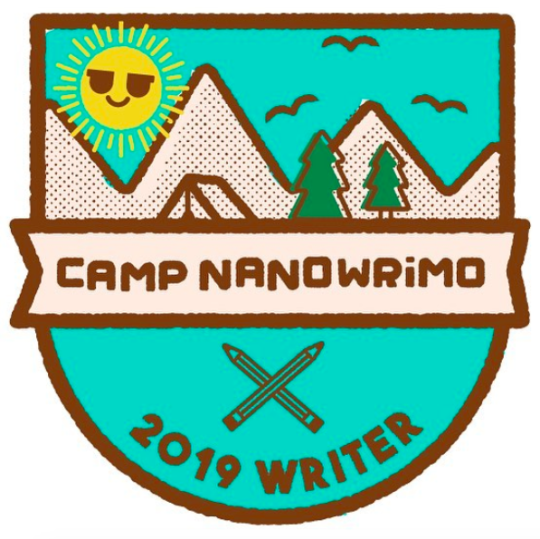 Camp NaNoWriMo is your online writers’ retreat, designed to help you set and reach your own writing goals. Join us this July for your next writing adventure!
Camp NaNoWriMo is your online writers’ retreat, designed to help you set and reach your own writing goals. Join us this July for your next writing adventure!Maybe you’ll try for the classic 50,000 words. Or maybe you want to set an hourly writing goal as you train for November. Or maybe you want to be wildly ambitious and write 80K words in the next 30 days. Whatever you’re writing, Camp is for you! You can…
Take on any writing project of your choice, from a novel to your thesis. Whether you’re on your first draft or your fourth, Camp NaNoWriMo is for you.Track a personalized goal that works for you. Set a word-count goal of up to a million words! Or keep track of hours, lines, or pages…Write with up to 19 fellow writers in a virtual cabin. Starting on March 25, you can make a private cabin with your friends, or be sorted into a public cabin to meet other writers. Declare your Camp Project for July today!Chris Baty's Blog
- Chris Baty's profile
- 63 followers



